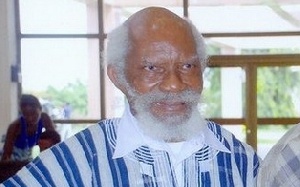The Attorney-General's Department cannot be blamed for the numerous loses of cases by the state in recent times, says Professor Justice V.C.R.A.C. Crabbe, a former Supreme Court judge.
Speaking to the Times on the sidelines of the Commonwealth Legislature Drafting course in Accra yesterday, Justice Crabbe said the AG as a nominal defendant in cases brought against government could only prosecute and win cases, if he had enough information on them.
The three-month course is being organised by the Commonwealth Secretariat, in collaboration with the Ministry of Justice and the Attorney General's Department.
It is being attended by 32 lawyers from The Gambia, Tanzania, Nigeria, Sierra Leone, Botswana, Lesotho and Mauritius, with Ghana as the host.
The public has in recent times been questioning the competence of officials of the AG' S Department, in view of the numerous cases lost by the state. But Prof. Justice Crabbe, a Statute Law Revision Commissioner, argued that the AG's Department was not involved in the building up of cases sent to court, as it was only called on to defend the cases.
He further contended that some of the cases though had no merit, were sent to court for political expediency.
Prof. Justice Crabbe, therefore, urged politicians to desist from questioning the credibility of judges when cases were in court, and explained that “judgement is based on the facts presented on a case and evidence adduced from witnesses".
Prof. Justice Crabbe, who is the course co-ordinator, in his speech earlier, outlined the course content as including international law and grammar, explaining that grammar was important in law drafting, irrespective of the language in which the law was written.
The Deputy Minister of Justice, Ebo Barton-Odro, in a keynote address, said effective laws were critical to improving the jurisprudence of Commonwealth member countries.
The Government of Ghana, he said, was excited to be involved in the programme aimed at training more legislative drafters for the sub-region.
Mr. Barton-Odro said legislative writing required constant training for professionals in the sector to be able to draft laws that were clear and unambiguous and easily understood by both academia and the ordinary man on the street.
"A poorly drafted law," he said, "leads to litigation, confusion, misrepresentation and misapplication of both in judicial sphere and execution of the law".
Mr Barton-Odro, therefore, urged participants to take the course seriously to imbibe the rudiments of law drafting, besides building their capacity in the field.
"You are at the threshold of an exciting, exacting and essential career; a life job of helping to solve problems of your respective jurisdictions through the drafting of Bills for Parliament and other legislative instrument," he stated.
The Head of Justice, Legal and Constitutional Affairs Division of the Commonwealth Secretariat, Jarvis Matiya, lamented the shortage of legislative law drafters in the sub-region and urged member countries to develop strategies to train people for the sector.
He said recruiting and retaining legislative drafters remained a key challenge to most Commonwealth member countries, and pointed out that "training and capacity building exercises like this is critical to addressing the shortfall".
Mr. Matiya assured of the Commonwealth Secretariat's commitment to continue sponsoring the programme.
The President of the Ghana Bar Association, Frank Beecham, commended the Commonwealth Secretariat for the programme which would help build the capacity of the lawyers.
In his welcome address, the Director of the Ghana Law School, George Sarpong, explained that the course was to address the scarcity of drafters so as to provide initial formal training for legislative drafters. He said it was also to develop the competencies of participants in the essentials of Legislative Drafting for the purpose of improving, their efficiency and effectiveness.**
General News of Tuesday, 24 July 2012
Source: Ghanaian Times













